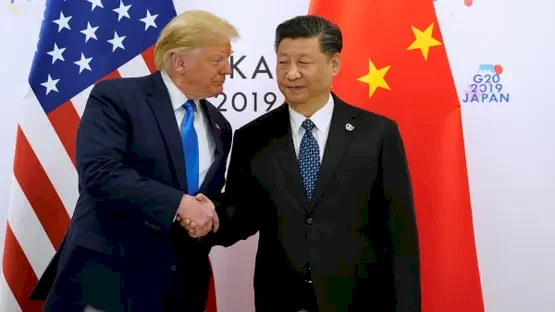
What is the Impact of the Trade Accord Between America and China on Global Markets?
SadaNews - Recent talks between the United States and China were characterized by positivity, as both sides reached understandings on a range of contentious issues, paving the way for both Donald Trump and Xi Jinping to finalize an agreement this week, according to analysts.
After two days of talks in Malaysia that ended on Sunday, a Chinese official said that the two sides reached a preliminary agreement on topics including export controls, fentanyl, and shipping tariffs.
The "Hang Seng China Enterprises Index" rose by as much as 1.3% on Monday, while the "CSI 300" within China increased by 1%, and the broader "MSCI Asia-Pacific Index" climbed by 1.5%, hitting a new record during the session. The dollar index weakened against major currencies.
What do analysts say?
Charu Chanana, Chief Investment Strategist at Saxo Markets in Singapore:
This seems like a win-win outcome for both parties, as the U.S. alleviates inflationary risks and supply chain disruptions related to rare earth elements and electronics, while China avoids widespread tariffs and keeps export channels open. However, until the leaders sign the agreement at the summit, what has been achieved is merely an extension of the truce, not a real breakthrough.
From the Chinese side, potential beneficiaries include exporters, device manufacturers, electric vehicle supply chains, logistics sectors, and e-commerce platforms, while the performance of rare earth mining companies might lag if export restrictions are postponed.
In the United States, tech companies and semiconductor firms may benefit from greater clarity in supply chains and reduced inflationary pressures.
Dailin Wu, Strategist at Pepperstone Group:
The short-term reaction could be cautiously optimistic.
Asian and Chinese stocks are likely to benefit, especially in technology, manufacturing, and export sectors. Major indices like the "Hang Seng" may see gains, while the offshore yuan could appreciate slightly against the dollar, reflecting an improvement in risk appetite.
The market will continue to watch the outcomes of the Trump-Xi meeting, so any gains will be limited, reflecting an improvement in high-risk asset sentiment more than a significant leap in markets.
Hebei Chen, Analyst at Vantage Markets in Melbourne:
A clear signal to end the prolonged tariff disruption is just what both sides need right now - for Trump, it’s about setting the stage for the next phase of policy, while for Xi, it’s an economic and political necessity to end an extended tug-of-war that can no longer be sustained.
This diplomatic easing could give Chinese stocks a boost, led by technology and export sectors, as investors price in a reduction in near-term risks.
Although the final meeting may be more symbolic than a decisive moment in negotiations, overcoming this hurdle - even temporarily - helps restore confidence in both American and Asian equities.
Shen Meng, Director at Chanson & Co, an investment bank based in Beijing:
While the details of the negotiations have not been officially disclosed, data from both the U.S. and China suggest that no tangible agreement has been reached.
Instead, a general framework has been laid out for how to proceed with future negotiations, which is enough to support sentiment in the Chinese A-Share market, especially in technology and export sectors.
Vishnu Varathan, Head of Economic Research for Asia (excluding Japan) at Mizuho Bank:
I believe the statements from Trump will favor both sides, as unnecessary suffering has been avoided. Chinese stocks are likely to find reasons for optimism after immediate threats to investors betting on a rise have receded.
Short-term rapid investment may be favored over long-term structural bets.
The tech sector may perform well with reduced barriers and declining fears of U.S. software export bans.
Chetan Seth, Equity Strategist for the Asia-Pacific region at Nomura Holdings:
Constructive talks between the U.S. and China bolster sentiment towards stocks, particularly in Hong Kong and mainland China.
All eyes this week will now be on the meeting between Presidents Xi and Trump, as well as the results of major American tech companies.
Kyle Rodda, Senior Market Analyst at Capital.com:
This is a very positive development for the Asia region, particularly for Chinese stocks, especially if we see a reduction in tariffs, as the removal or scaling back of tariffs on fentanyl could lift one of the obstacles to China's growth.
It is clear that the Chinese economy is still slowing down, and may be in a deflationary phase, so activating trade and reducing the uncertainty associated with it will help address that, with the possibility that benefits could extend to the entire region.
If a comprehensive trade agreement is reached, it would be a result that comes sooner than expected, which is a positive development for everyone.
Strategic analysts, including Joseph Capurso from Commonwealth Bank of Australia:
The Australian dollar may trade this week at its highest level in over a month if Trump and Xi reach an agreement; and while it is unlikely to make breakthroughs on all issues, market expectations have risen following the weekend news.
Our base scenario is an extension of the trade truce to keep communication channels open and reach an agreement on some issues.

Gold and Silver... From Historical Peaks to Collapse

Partial Financial Shutdown Begins in the United States with Anticipation of Quick Resoluti...

Losses Devour a Third of Silver's Value While Gold Experiences Its Biggest Decline Since t...

Trump threatens to impose tariffs on any country selling oil to Cuba, will reveal his nomi...

After rejecting Maliki.. What are Trump's economic cards to pressure Iraq?

Jordanian Central Bank Decides to Maintain Interest Rate

Oil Continues to Rise Amid Increasing US Threats to Iran
